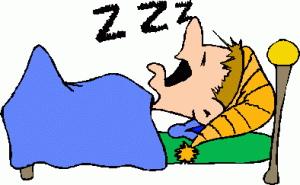(844) 5-SPEECH
Go Ahead, Catch Some ZZZzzZZzzz’s!!
January 14, 2015
Go Ahead, Catch Some ZZZzzZZzzz’s!!
“Sleep is the golden chain that ties health and our bodies together.”- Thomas Dekker
Why is sleep so important?
Your body can be compared to a battery; it must be recharged on a regular basis to function properly. Good quality sleep is critical for one’s overall physical and mental health. A good night’s sleep enhances memory, stimulates creativity, improves overall performance, sharpens attention, improves physical health, and lowers stress levels.
How much sleep do you need?
Amount of sleep varies for each individual, but on average the body needs about 7-8 hours of quality sleep every night. It is best to go to bed at a regular time each night, and wake up at a regular time every morning.
What are some signs of a sleep disorder in adults?
Obstructive Sleep Apnea (OSA) is a cessation of airflow for greater than 10 seconds with continued chest and abdominal effort. Symptoms of OSA in adults include:
- Heavy snoring
- Breathing stops while sleeping and results in a ‘snort’
- Day time sleepiness
- High blood pressure
- Morning headaches
- Restless sleeps
- Depression
- Anxiety
- Short term memory loss
- Intellectual deterioration
- Temperamental behavior
- Poor job performance
- Overall weakness
- Dry mouth
- Mouth breathing
If you have any of these symptoms, and feel you may have a sleep disorder, consult your physician or ENT (Ear Nose Throat doctor) as soon as possible!
What are some signs of a sleep disorder in children?
Symptoms of OSA in children include:
- Snoring
- Hyperactivity
- Developmental delay
- Poor concentration
- Bed wetting
- Nightmares
- Night terrors
- Headaches
- Restless sleeps
- Obesity
- Large tonsils
- Noisy breathers
- Chronic runny nose
- Frequent upper air way infections/ earaches
If you feel that your child has any of these symptoms consult your child’s physician or ENT as soon as possible! A sleep disorder can impact your child’s overall well- being and ability to function with his/her maximal potential.
Attention Deficit/ Hyperactivity Disorder (ADHD) and Sleep?!
Attention Deficit Disorder – Inattentive Type is a disorder characterized by inattention, easy distractibility, disorganization, procrastination, and forgetfulness. Children with this disorder typically shift from task to task without finishing, become easily distracted, get bored quickly, make careless mistakes, and have difficulty with organization. Additionally, it has been estimated that as many as 45% of children with ADHD have some form of speech and language impairment (Tirosh & Cohen, 1998).
- Snoring is associated with higher levels of inattention and hyperactivity
- 81% of snoring children with ADHD could have their ADHD eliminated if their habitual snoring were effectively treated. Chervin, RD et al. Symptoms of Sleep Disorders, Inattention, and Hyperactivity in Children, 1997, Sleep, 20(12): 1185-1192.
(Brian Palmer, D.D.S., Kansas City, Missouri, USA, April, 2001)
It is important to get quality sleep! If you feel that you or someone you know has a sleep disorder, is a restless sleeper, or just isn’t getting quality sleep consult a physician or ENT. The ENT will assess the tonsils, adenoid pad, congestion, snoring, and velum competency. A good night’s rest will improve overall function both physically and mentally.
Hope you enjoyed this blog post! ZZzZzzzZZz
Pamela Leibowitz MA CF-SLP TSSLD
Recent News

Did What You Hear Make Sense?
March 3, 2025

The Importance of Early Intervention
January 27, 2025

How Parents Can Support Everyday Language Building
January 20, 2025

The Benefits of Support Groups for Adolescents Who Stutter
January 13, 2025

3 Common Misconceptions About Autism Spectrum Disorder (ASD)
January 6, 2025

What are Core Words?
December 30, 2024


